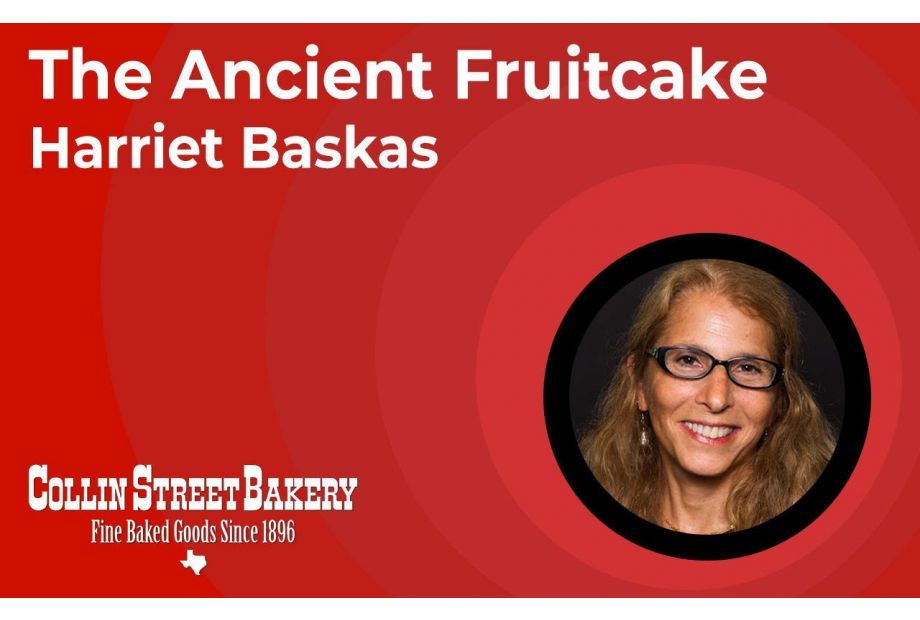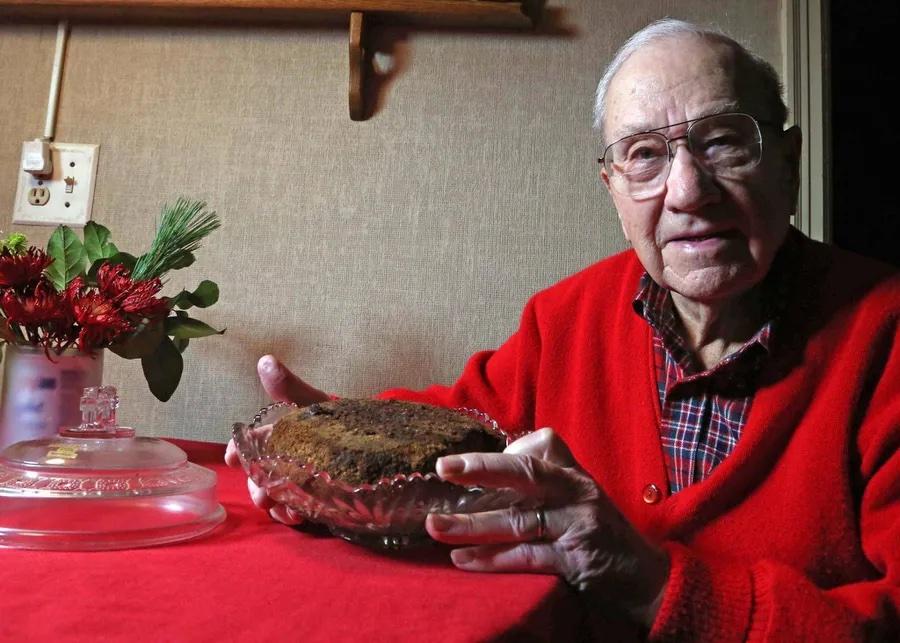The Ancient Fruitcake
Author & Journalist Harriet Baskas Share Stories of Really Old Food
Author and journalist Harriet Baskas doesn’t like new food. But, she loves old food. To clarify, she likes food, but she wouldn’t consider herself a “foodie.” As a lead for the Humanities Washington, a nonprofit in Washington state, Harriet is more interested in the history of food rather than its taste. As the organization's website states, its goal is to promote “a deeper understanding of others, ourselves, and the human experience, in order to discern and promote the common good.” The area in which Harriet has chosen to cultivate a deeper understanding is food and how food can bring people together.
When we heard about Harriet and her educational mission, we knew we had to get in contact. You see, Collin Street Bakery's purpose and goal are to "bring friends & family together across generations"—sounds like something in which Harriet would have some interest. Listen to our interview to learn some amazing stories about really old food.
Listen to our Interview with Harriet Baskas
Source: The Ancient Fruitcake: What Really, Really Old Food Tells Us about History, Culture, Love, and Memory
Our Interview with Harriet Baskas
Collin Street Bakery (CSB): Is there a specific story that got you more interested in old foods as a topic? Harriet Baskas (HB): Yes, absolutely. While I was working on a book about things museums don't show you, I came across the P.T. Barnum Museum in Bridgeport, Connecticut. They have a piece of wedding cake from the wedding of Tom Thumb to Lavinia Warren in 1863. Their wedding was a very big deal because Tom Thumb was a very famous attraction that P.T. Barnum had been taking around the world. It was the middle of the Civil War. People needed some happy news, and this wedding aided that effort. So, a piece of the wedding cake is in the museum.
CSB: Wow! That’s fascinating. The Barnum & Bailey Circus was a big part of Collin Street Bakery’s early distribution as a company because they were fans of the fruitcake. HB: Well, there you go. In the early days, wedding cakes and groom’s cakes were often fruitcakes doused heavily with liquor, which is what keeps them around for a long time. So Tom Thumb’s piece of cake is in a box in the back room of the museum. It turns out that there are a lot of old wedding cakes from celebrities and families that have been passed down from generation to generation and preserved in museums.
CSB: Certainly there’s some Collin Street Bakery's Deluxe® Fruitcake in the back of a museum out there? HB: Oh, I’m sure of it! I’ll keep my eyes peeled.
CSB: Moving on to your presentation for Humanities Washington. Can you give us a quick overview of what the presentation entails for each intended audience? HB: Yes. Every state has a Humanities Committee, and I currently serve on the Speakers Bureau for Humanities Washington. Our team goes around the state giving presentations on all sorts of things, and I did an event around my state talking about old food and what it tells us about history, memory, love, and culture. I've been collecting stories – things I have found out in the world of bits of old food that are out there. As I travel the world, I hear and collect people's stories of old food that's in their families, which is really the payoff for me.
CSB: That’s so fun! It seems that tradition is super important to you. To use food and family relics as a generational reference point. What do you think about that as a general idea? I know it's not something that's typical these days. How do you feel about traditions and people starting them? HB: Many of us inherit items from our families. Although I never use them, I possess my mother’s pearls. If I had a piece of her wedding cake in my freezer, I'd think of her every time I'd see it. It doesn't have to be pearls or a wedding cake. But it's surprising for a family or community to discover memories of our past.
CSB: Is tradition something you see progressing or regressing as time goes on? HB: Well, there are all sorts of traditions. When I do my presentations about old food, people begin to talk about the meals. Thanksgiving meals or Christmas meals etc. There are all sorts of cultural meals that bring us together. Those are traditions. The food gets eaten, cleaned up, or thrown away. Then there are the recipes that people have, and that's the tradition that makes people remember their own mother or grandmother and everyone getting together to make this meal or that meal. I don't think traditions are going away. People are maybe just finding them in different ways or creating them in different ways.
CSB: Can you talk a little bit about “petrified food” that you discuss in your presentation? What are some of those foods that you've called “hidden treasures?” HB: Of course. One of the foods in my presentation is a 139-year-old fruitcake made by Fidelia Ford from 1878. She died before anybody could cut into it or eat it. Maybe some people say there's only one fruitcake in the world that keeps going around, but that fruitcake didn't get eaten because the maker died before anyone could eat it. That cake was just held onto by that family.
Source: The Globe And Mail
CSB: Wow. And it still exists? HB: Yes. Her great-grandson, Morgan Ford, went pretty far with that cake. He would take it to school groups and show it off. He made an appearance on the Tonight Show with Jay Leno in 2003 with the fruitcake. He told people that the reason they kept the now-famous fruitcake was that it reminded that family of their past. It was a connection to their great-grandmother. So that's one example.
Source: Detroit News
CSB: So cool. Any others to share? HB: The Henry Ford Museum found out I was researching old food and shared what may be the world's oldest doughnut. A few days before her 12th child was born in January 1890, a 43-year-old farmwife, Sarah Fought, made a batch of doughnuts for her family. So she's about to have her 12th kid. What does she do? She has to make some food for her family, so she makes some doughnuts. Unfortunately, she died shortly after childbirth. Her family didn't want to eat all the doughnuts, so they saved some of them and passed them down from generation to generation. Finally, one of them ended up at the Henry Ford Museum.
CSB: Woah! That’s a sad and astonishing story. Collin Street didn’t even exist until 1896. HB: There are so many stories like that. But some museums have things that are so valuable they can't afford to set them out because they can't pay the insurance to display to the public. Therefore, many stories never get told.
CSB: Maybe some people have old Collin Street fruitcake tins in their home. HB: Oh, I’m sure they do! Did you hear about the fruitcake they found at the South Pole last year?
CSB: We did hear about that! Fascinating how pioneers utilized fruitcake as a hearty snack while on an expedition! HB: Sure is, and I hope more fruitcake stories roll your way with Collin Street’s long history. There is so much we can learn from the food of our past.
CSB: We certainly hope for that as well. In the meantime, thank you for traveling the country to tell your stories, Harriet. And thank you for taking the time to share them with us. HB: Of course. I would love to do it again sometime! If you bring the fruitcake of course. CSB: That’s a given.
To follow her journey, find her on Twitter. And if you care to purchase one of her books, find them on Amazon. |
Do You Have Any Really Old Food Stories?
Share them with us in the comments below! If your story catches our eye, we might even reach out for an interview. Pretty cool, huh?




